Hardie Karges is a writer, folk-art dealer, traveler, carpenter, and video-maker. He has been to 145 countries (and counting) and lived in several of them. He speaks three languages fluently and others to lesser degrees. Please enjoy this week-in-the-life of Hardie Karges, trekking through the Balkans!
This post was originally published in 2013. It has since been updated for accuracy of links and content.
Day One
I wake up early to catch the bus from Tirana, Albania to Tetovo, Macedonia. That’s the only bus that goes east toward Bulgaria. I’m trying to visit every country in the Balkans, in the process of visiting every country in the world. Going north toward Montenegro is no better. Most roads in Albania lead to Greece, but that’s where I just came from. The bus leaves from “the large muddy patch” (per guidebook description) in front of the train station, something as Balkan as byreks. The bus doesn’t look like much, but I suppose it’ll make it.
There’s another backpacker, too, hair down his back, but he doesn’t seem anxious to talk to me, “more backpacker than thou” I guess. He’s talking to the bus drivers, probably not realizing they don’t understand a word of his English. The bus finally shoves off.
Casinos line the streets, typical in former Communist countries. Washington didn’t win the war; Las Vegas did. The petrol stations are named ‘Castrati’. The chaotic streets gradually become chaotic countryside, broken bruised and beaten, and dotted by bunkers, not yet having received the coat of paint that the capital has, a splash here, a stripe there, and a mosaic in between, anything to forget the lost decades of Communist rule and the psychological misgivings that can ensue.
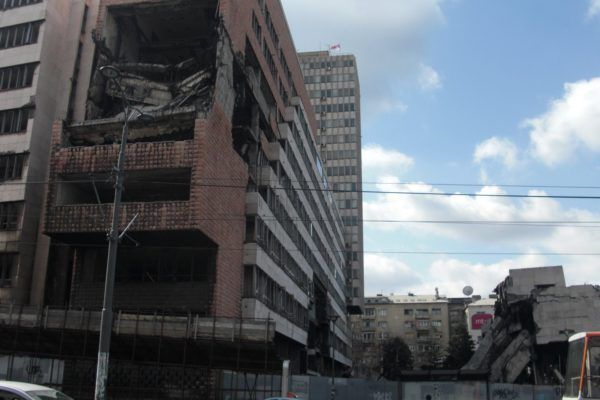
Somehow Nature always survives regardless of men’s mistakes. Still Albania seems a bit more broken than most, with neither plan nor order. By the time we approach the border we’re high into the hills, past 19th century-style mining operations and failed industry.
By this time I’ve broken the ice with my fellow backpacker. Turns out he’s Croatian and a really nice guy, hardly the arrogant a**hole I’d imagined. I feel foolish, but not as much as I would have if we’d traveled the whole way unspeaking. He’s on his way to India via Istanbul and speaks good English, having practiced much in the tourist industry of Dubrovnik. His name is Mladen.
Upon reaching the border itself traffic is so clogged that we change buses to avoid long lines; big mistake. As we continue on the other side it’s soon snowing. Even Mladen looks at me and goes, “WOW!” And I’m thinking, ‘Don’t you freak out or I’ll really freak. You’re a local!’ But I don’t say anything. It’s been a long hard winter for Europe.
We make it through the snow okay, but that’s not good enough. The old bus pops a gasket or something and soon is wheezing like an old woman climbing six flights of stairs. We pull over and the driver puts on his greasy mechanic’s apron like, “I’ll show the bus who’s boss!” Yeah, right. This old bag of nuts and bolts ain’t goin’ nowhere.
So we wait and wait and wait for the company to send a van to pick us up. Mladen’s going to miss his bus to Istanbul, but that’s good for me, since he’ll continue on to Sofia, like me, instead. At this point his presence and command of All Things Slavic are very reassuring to me, particularly since we’ve become quite friendly. I realize at this point how vulnerable and insecure I am, hardly the master traveler and linguist I may come off as sometimes, to myself if not others, whether intentionally or otherwise. Down deep I’m a scared little child.
My only advantage is that I’ve been here before, lived my whole life here in fact, trembling before the vagaries of circumstance and creating new gods to save me. Bottom line: I hate that sinking feeling when you’re stuck out of luck and there’s nowhere to pass the buck. I know it well.
The bus driver finally flags down an empty van and pays the van driver to take us on into town. Hey, we could’ve done that an hour ago. That’s what we would’ve done ten years ago without cell phones and the miracles they bring. So by the time we finally limp into the station at Tetova, Macedonia, it’s dark and cold and lonely. I’m really glad Mladen is here. Maybe he’s glad, too, but I don’t ask. Guys don’t do that.
Problem is, the bus to Sofia leaves from Skopje, and that’s still an hour and another bus ride away, something I didn’t like in the original plan, and am now regretting. If you want to traipse the Balkans, bring a friend. You might need it.
We persevere on to Skopje, where there’s a bus to Sofia at midnight. So we buy tickets and have time to kill; things are looking up. It’ll be Sofia by morning, an up-and-coming tourist destination, there and Bulgaria in general. But now we’ve got three hours to kill, so we trade stories and talk trash and eat more byreks—oily pies—which Mladen explains to me are ‘real Balkan food’, as if I didn’t already know after living on them in Tirana.
At least there’s a real bus station in Skopje. That’s refreshing. But our midnight bus is late and I’m freezing outside waiting for it. I mean FREEZING! I’ve been cold for a month, but this is ridiculous!
Our bus finally shows up and we pile on quickly. Macedonia passes under our wheels, almost an entire country traversed in darkness. At least the border crossing to Bulgaria is civilized; they collect the passports then bring them back all stamped up and ready to go.
Day Two
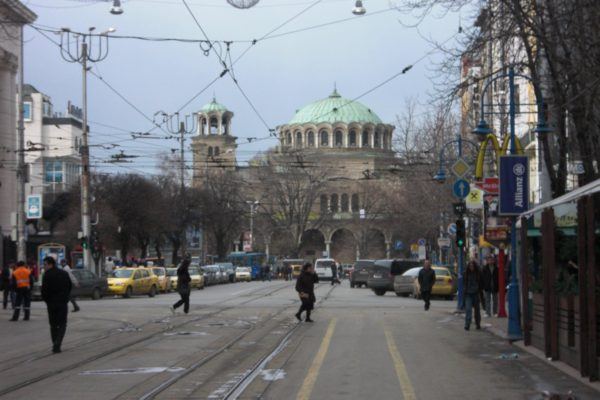
When the bus finally pulls into Sofia the sun is rising. Mladen and I say our goodbyes and I go for a cup of espresso. It costs less than the 3-in-1 Nescafe. It’s good, too. Things are looking up.
I kill time waiting to go to my hostel. My directions use McDonalds as a landmark, but there are more than one, so I fumble around the early morning streets.
Modern Sofia never sleeps. The Bukowski Bar next to the entrance of the hostel I’ve booked is still going strong from the night before as mid-morning creeps up. The hostel is full, but they’ve got another around the corner that shares an entrance with an Irish pub, apparently presided over by a real live Irish person, or at least a Brit. That’s who the patrons are.
I’m hungry. So after starving myself in Albania, too lazy to deal with currency exchange, I gorge in Sofia, plenty of foreign exchange since the transport companies won’t take Euros, and I had to cash a wad.
Next stop is Belgrade, but regional transportation is all flakey. The bus requires a transfer in Nis. The train won’t sell tickets until the hour before the voyage (?). It seems like I’m spending all my time in Sofia at the bus station. At least the food is good.
Day Three
I decide to take the bus. By the time I get to Belgrade it’s mid-afternoon.
By now I’ve gotten wise and booked a hostel close to the bus station. The only problem is the staff’s constant cigarette smoking, but other than that it’s way cool except for the loss of privacy in a dorm.
It’s all men, too, from Germany, Australia, and one who I later find out is Mexican, from Guadalajara. He came in on the train I forewent. The G8 of international travel is now expanding to G30. I consider that proof of justice in the world. He even speaks good English. I’ll feel hurt if he rebuffs my Spanish, of course, but go for it anyway, Psycholinguistics 101.
But we’re cool, talking about things Latino into the night, fueled by the jug of decent Serbian beer being offered. I decide I like hostels; they give a safe haven and source of information to travelers and interaction with others where such is almost impossible with locals.
Day Four
Belgrade is pretty uninspiring, but not so bad. It could use a coat of paint.
They say nightlife is the big attraction, but that doesn’t much work for me any more. So I walk a lot, scouring the market for things not to buy.
This seems like a good place to drink, but I’ve already done that, so I get caught up on Internet.
Next stop is Pristina, Kosovo. Show me a former war zone and I’ll show you a travel bargain.
Day Five
I get an early start for another day of travel. A long lonely road leads from Belgrade to Kosovo, like some silly cliché being spoken for the umpteenth million time, but lending some credence to its claims of independence, regardless of the ethnicities involved. But first we go more than half way back to Nis before turning west, aggravating my ‘no backtrack’ sensibilities a bit.
At the de facto border Serbia checks me out of the country, but I don’t think I ever got checked in, just glanced at. I guess the UN doesn’t do that; only real countries do. Kosovo has still got a ways to go.
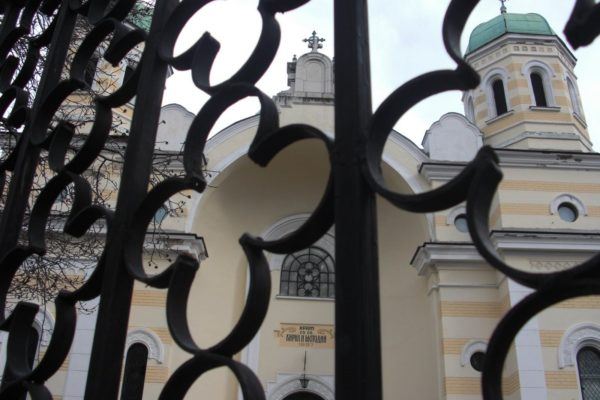
Immediately the scenery changes, though. Instead of the well-defined countryside of Serbia, with its tilled soils and trash-strewn roads and streams, we’re back into mixed town/country hodge-podge like Albania. I guess it’s part of the ethnic character of these ethnic Albanians. Is city planning hard-wired into the DNA?
I get into town after dark and get a taxi up into the hills overlooking town where ‘the professor’ runs his guesthouse/hostel. He’s a nice old man who studied engineering in the UK, doing graduate work some time back in the 70’s. Hey, wait a minute… I graduated college in the 70’s. Do I look that old? Anyway, he’s got a nice enough place with real radiated heat in the rooms. We need it; it’s cold.
Day Six
The first thing I see is snow coming down. Brrrrrr. It finally stops so I take a long walk into town.
Kosovo is a joint project between the UN and EU, keeping the Serbians at bay, the EU presence in evidence everywhere. As such it’s the largest preserve of second-language English speakers between Athens and Dubrovnik.
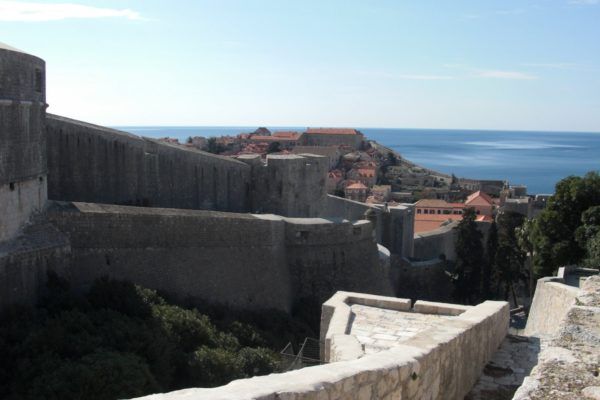
I’m tired of being cold, so begin to consider other options. Transportation agents just assume I’ll be returning, as if I were another UN operative, as if they’d never seen a tourist buy a one-way ticket.
The food here is good, thanks to the historic association with Islam and Ottoman Turkey. In addition to the ubiquitous kebaptores and their meaty grill smells wafting over the streets, there are gulashes and musakas and other saucier dishes that are all quite good and reasonably priced, Islamic food not unlike what are known in Asia as ‘curries’.
Day Seven
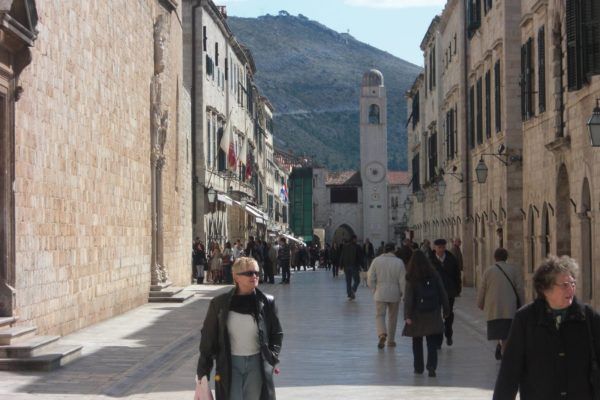
Tonight I’ll travel onward to Montenegro, so that gives me another day to kill in Pristina. No problem. I’m enjoying playing secret agent in a UN-controlled state. At the bus station some guy puts the moves on a woman sitting next to me, and won’t stop. It’s like watching the Discovery Channel.
Finally I go get on the bus, then so does he. We shove off, and soon come to the mountains. Not only do we climb the narrowest steepest mountain pass that I’ve EVER been on, it just happens to be at the border between two countries, and it just happens to be snowing at the time. Yeow! This is nothing like the little dusting Mladen and I got back in Macedonia.
This is real! Snow banks are piled up on the side of the road, plows are operating steadily, and many passages are one-lane-only. Most of the other traffic are eighteen-wheelers! Okay God, here’s the deal: just one more favor and we’re even, okay? I promise! We’ll probably make it. We usually do.
The irony is that I just spent a week to go the long way between two points that probably would’ve taken less than a day if I’d gone directly north from Tirana. I guess that’s backpacking. I guess that’s hyper-travel.
Hardie Karges just embarked on his next major trip through South and Central Asia, covering 8-12 countries. He has published poetry, and writes blogs on travel and world music, in addition to his personal blog.
“Hypertravel: 100 Countries in 2 Years (Backpacker’s Guide to the World and the Soul),” his first full-length book, was published in January 2012. His second book, “Backpackers and Flashpackers in Western Europe: 500 Hostels in 100 Cities in 25 Countries“, is the first in a series of guides to hostels worldwide, was published in December of the same year.



Hi Hardie and Nora,
Great article Hardie. Perhaps I relate because we’re in the same generation — graduated in the 70s — or because of your alternative way of seeing the world. But the thing that was really touching is your ability to admit, “Down deep I’m a scared little child.”
Good, honest writing will always get my vote.
~Josie
PS: Hope your recovery is going well, Nora!
Thanks, Josie. The new ‘gap year’ is 55! Ha!
Thanks, Josie! I think that we never truly outgrow the “scared little child” in us; we just become better at hiding it!
My recovery is coming along….thanks for checking in! 🙂